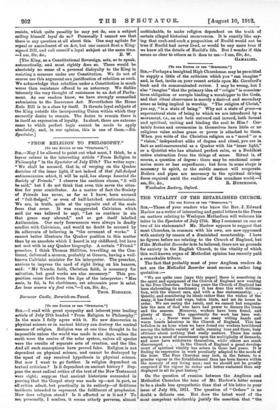[TO THE EDITOR or THE "SPECTATOR. "] SIR,—I read with great
sympathy and interest your leading article of July 27th headed " From Religion to Philosophy." In the main I fully agree with it. No new discoveries in physical science or in ancient history can destroy the central essence of religion. Religion was at one time thought to be impossible unless the world was made in six days, unless the earth were the centre of the solar system, unless all species were the results of separate acts of creation, and the like. And all such conceptions have proved false. Religion is not dependent on physical science, and cannot be destroyed by the upset of any received hypothesis in physical science. But now I want to go further. Is religion dependent on textual criticism P Is it dependent on ancient history P Sup- pose the most radical critics of the text of the New Testament were right; suppose that ancient historians succeeded in proving that the Gospel story was made np—not in part, as all critics admit, but practically in its entirety—of fictitious incidents intended to represent the fulfilment of prophecies. How does religion stand P Is it affected or is it not P To me, personally, I confess, it seems utterly perverse, almost
unthinkable, to make religion dependent on the truth of certain alleged historical occurrences. It is exactly like say- ing that such-and-such a proposition of Euclid would not be true if Euclid had never lived, or would be any more true if we knew all the details of Euclid's life. But I wonder if this seems as clear to others as it does to me.—I am, Sir, &c.,
GAMALIEL.


































 Previous page
Previous page